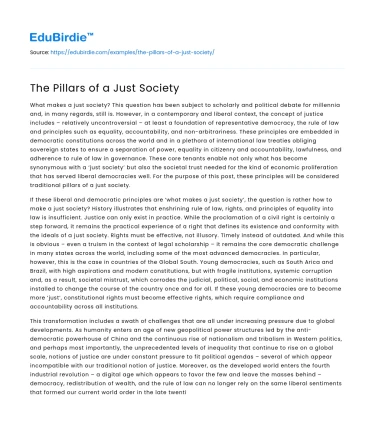What makes a just society? This question has been subject to scholarly and political debate for millennia and, in many regards, still is. However, in a contemporary and liberal context, the concept of justice includes – relatively uncontroversial – at least a foundation of representative democracy, the rule of law and principles such as equality, accountability, and non-arbitrariness. These principles are embedded in democratic constitutions across the world and in a plethora of international law treaties obliging sovereign states to ensure a separation of power, equality in citizenry and accountability, lawfulness, and adherence to rule of law in governance. These core tenants enable not only what has become synonymous with a ‘just society’ but also the societal trust needed for the kind of economic proliferation that has served liberal democracies well. For the purpose of this post, these principles will be considered traditional pillars of a just society.
If these liberal and democratic principles are ‘what makes a just society’, the question is rather how to make a just society? History illustrates that enshrining rule of law, rights, and principles of equality into law is insufficient. Justice can only exist in practice. While the proclamation of a civil right is certainly a step forward, it remains the practical experience of a right that defines its existence and conformity with the ideals of a just society. Rights must be effective, not illusory. Timely instead of outdated. And while this is obvious – even a truism in the context of legal scholarship – it remains the core democratic challenge in many states across the world, including some of the most advanced democracies. In particular, however, this is the case in countries of the Global South. Young democracies, such as South Arica and Brazil, with high aspirations and modern constitutions, but with fragile institutions, systemic corruption and, as a result, societal mistrust, which corrodes the judicial, political, social, and economic institutions installed to change the course of the country once and for all. If these young democracies are to become more ‘just’, constitutional rights must become effective rights, which require compliance and accountability across all institutions.
Save your time!
We can take care of your essay
- Proper editing and formatting
- Free revision, title page, and bibliography
- Flexible prices and money-back guarantee
This transformation includes a swath of challenges that are all under increasing pressure due to global developments. As humanity enters an age of new geopolitical power structures led by the anti-democratic powerhouse of China and the continuous rise of nationalism and tribalism in Western politics, and perhaps most importantly, the unprecedented levels of inequality that continue to rise on a global scale, notions of justice are under constant pressure to fit political agendas – several of which appear incompatible with our traditional notion of justice. Moreover, as the developed world enters the fourth industrial revolution – a digital age which appears to favor the few and leave the masses behind – democracy, redistribution of wealth, and the rule of law can no longer rely on the same liberal sentiments that formed our current world order in the late twentieth century. Citizens of the Western world appear to be losing the very political power that led to the quid pro quo embodied in the social contract of a Western twentieth-century society. As such, what we today consider fundamental pillars of justice cannot be taken for granted and must instead be subjected to a continuous process of revitalization, dialogue, and improvement.
This is exactly what just society is about for me. With the challenges as a backdrop and the promotion of equality and rule of law as a destination, the just society is an ambitious and necessary step towards reinforcement and revitalization of the fundamentals of justice.
As a legal and human rights scholar, the global developments sketched out above challenge not only the core notion of human rights but also the underlying liberal principles that enabled the proliferation of human rights in the first place. Democracies are not democratic without the rule of law and cannot prosper without some level of social and economic equality. These are foundational aspects of a just society and, accordingly, a core focus of just society. A project, which aspires to promote equality and rule of law in young democracies through dialogue and teaching, but also aims to approach the ‘fundamentals’ of a just society in recognition of the fact that in order to make societies more just, contemporary ideals and notions must continuously be subjected to a process of interdisciplinary criticism and scrutiny.






 Stuck on your essay?
Stuck on your essay?

